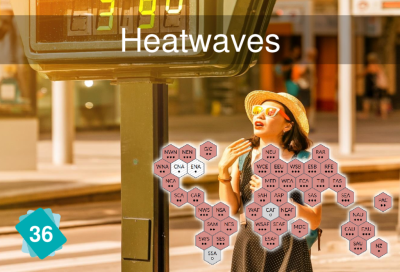En-en adult card 36 heat waves
Card #36: Heatwaves
One consequence of higher temperatures is more frequent heatwaves.
Explanation
A heat wave is a meteorological phenomenon of abnormally high air temperatures, day and night, lasting from a few days to a few weeks, over a relatively large area.
Facilitation advice
This card can have a very strong potential for impact because heat waves occur in developed countries and players will have direct experience of their increase in frequency. With this card, we can highlight the fact that climate change is a global problem that does not only affect the poorest people.
Correction
Causes
Consequences
- Forest Fires
- Human health Heat waves can be devastating, especially for the elderly.
Other possible links
Other consequences
- Droughts Heatwaves can cause droughts. They often go together.
To go further
France
One hundred and sixteen scientists concluded, in a study published by the American Geophysical Union, that the 2016 heat wave (the warmest ever recorded so far) was "only made possible by significant anthropogenic warming".
The European heat wave of June 2019 is quite intense but only lasted a week. This heat wave is especially remarkable for its earliness; in fact it takes place at the beginning of the summer, at the end of June. During this heatwave, the national heat record was broken on 28 June with 46.0°C in city of Vérargues[1].
The European heatwave at the end of July 2019 reaches its peak on Thursday 25 July. Temperatures have never been so high in the South-West, which recorded 25.4°C at the coolest part of the night[2]. In Paris, the night of 24 July was the third hottest night since temperatures were recorded, with 25°C at the coolest part of the night. The record was set in August 2003 at 25.5°C. The heat wave hit the area very hard with 20 departments on red alert and 60 on orange alert on Thursday 25 July. Paris broke its absolute temperature record on that day with 42.6°C recorded at 4.32 p.m.[3]
United States
Heat waves are the deadliest weather phenomenon in the United States[4]. Between 1992 and 2001, heat-related deaths were more than 2,190 compared with 880 deaths from floods and 150 deaths from hurricanes. Each summer more than 6,000 people are hospitalised in the United States because of the heat, which hits people unevenly. On average, households earning less than $37,000 per year are twice as affected as households earning more than $60,000[5].
References
- ↑ Usbek & Rica Unsustainable temperatures earlier than expected (French)
- ↑ France Info Record temperatures vigilance red (French)
- ↑ Le Figaro Paris beats its absolute heat record (French)
- ↑ Oxford Academic Relation between Elevated Ambient Temperature and Mortality: A Review of the Epidemiologic Evidence
- ↑ Agency for Healthcare Research and Quality (AHRQ) Most People Struck Down by Summer Heat Are Poor
